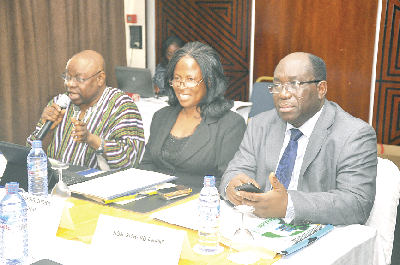Parliamentarians push for increased investment in family planning
 Members of the Parliamentary Committees on Health, Gender and Children, and the Caucus on Population and Development have held a meeting in Accra to discuss how to achieve international commitments made to improve reproductive health, particularly family planning.
Members of the Parliamentary Committees on Health, Gender and Children, and the Caucus on Population and Development have held a meeting in Accra to discuss how to achieve international commitments made to improve reproductive health, particularly family planning.
The meeting was part of the Health Policy Project being implemented by the National Population Council (NPC) together with the Africa Regional Office of Partners in Population and Development (PPD-ARO), which seeks to advance health equity and sexual and reproductive health, including family planning.
PPD is a governmental alliance of 25 developing countries, including Ghana, established to promote population and development and reproductive health through south-south co-operation.
To track and demand accountability from governments on the implementation of global and regional commitments on health that governments have signed, PPD-ARO supported the creation of the Southern and Eastern Africa Parliamentary Committees on Health ( SEAPACOH), a network of African Parliamentary Committees on Health.
In 2011 and 2012, the PPD-ARO invited members of the Ghanaian parliamentary committees on Health, Gender, and Children and the Caucus on Population and Development and other parliamentarians to participate in some high-level policy meetings of SEAPACOH in Kampala.
Recommendation and commitments were made by delegations at those meetings and last year, a follow-up meeting was held in Accra, to discuss the implementation of the Ghana Action Plan.
The Accra meeting discussed progress in achieving the objectives and targets of the Ghana Action Plan and other related activities.
Presenting the progress of the Ghana Action Plan, Dr Richard Anane, the MP for Nhyiaeso, said the MPs have since the Kampala meetings advocated budgetary allocation for reproductive health (RH) including family planning.
They have also been advocates of reproductive health and family planning, both within the Chamber of the House through statements on the floor and outside of the House, by making public speeches and pronouncements.
“At the last SEAPACOH meeting in August, 2012, Ghana committed itself to work towards mainstreaming reproductive health including family planning, maternal health and child health activities and to bring together all the relevant committees and caucuses in Parliament and build their capacity,” Dr Anane added.
According to him, as a result of their advocacy efforts, there is free maternal and child care now, under the reviewed National Health Insurance Authority (NHIA) Act.
“We have also supported the allocation and disbursement of funds for reproductive health, including family planning and further collaborated with IPAS for greater liberalisation of the abortion laws in Ghana.
Dr Anane stated that the MPs were working to get the government to allocate 0.5 per cent of the health budget to family planning by 2014 and further explore the possibility of the government taking over the funding for family planning.
“Our stakeholders, comprising the Ministry of Health and the Coalition of Health and related NGOs, were tasked to help arrive at the cost implications of the commitment and they have indicated they will be submitting the advice soon,” he added.
Prof. Stephen Kwankye, Executive Director of NPC, in a presentation at the meeting emphasised that the government needs to invest in family planning since “no country has come out of poverty without making family planning a national priority.”
Citing China, Thailand, Taiwan and South Korea, as countries which have attained high levels of development by focussing on family planning, Prof. Kwankye indicated that “investing in family planning will be a blessing for national development,” as fewer births mean fewer resources required to provide basic social services,
“Fewer births mean averted costs associated with antenatal healthcare, delivery and infant care; fewer pregnancies will lead to reduction in labour complications, unsafe abortions and maternal deaths and longer birth spacing leads to fewer newborns and under-five deaths,” said Prof. Kwankye.
He pointed out that family planning promotion in Ghana was faced with a lot of challenges, including inadequate commitment and funding from central government to make the issue a priority in the national development agenda and misconceptions about side effects of family planning
He urged the MPs to serve as ambassadors of family planning in their constituencies to increase uptake and suggested that they should go through capacity building on integration of population variables into development planning to enable them to appreciate the relationship between family planning and economic development.
He also stated that the network had expanded to embrace the whole of Africa and, therefore, it was now called the Network of Africa Parliamentary Committees on Health (NEAPACOH).
Mr Patrick Mugirwa of PPD-ARO, who was also at the meeting, gave an overview of SEAPACOH,
He said the 2013 NEAPACOH meeting will be held in September 16 – 20, 2013 in Kampala and some of the Ghanaian MPs would be attending.
In her remarks, the Minister of Social and Allied Agencies, Mrs Comfort Doyoe Cudjoe Ghansah, congratulated the parliamentarians on their commitment to tracking the implementation of global and regional commitments on health signed by it and demanding accountability from the government.
By Rosemary Ardayfio/Daily Graphic/Ghana
